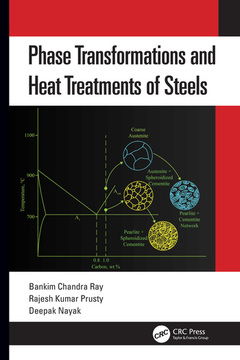Phase Transformations and Heat Treatments of Steels

The perpetual flow of understanding between phase transformation that controls grain/microstructures and heat treatment which decides the size of grains/microstructures of steels is not well articulated in the perspective of undergraduate students. In Phase Transformations and Heat Treatments of Steels, theories of phase transformation have been used to obtain a desirable phase or combination of phases by performing appropriate heat treatment operations, leading to unification of both the concepts. Further, it includes special and critical heat treatment practices, case studies, local and in-service heat treatments, curative and preventive measures of heat treatment defects for several common and high-performance applications.
Features:
- Presents fundamentals of phase transformation in steels
- Analyzes basics of phase transformation due to heat treatment of steel under various environmental conditions
- Explains application of heat treatment for different structural components
- Discusses heat treatment defects and detection
- Emphasizes heat treatment of special steels and in-situ heat treatment practices
1. An introduction to Metals. 2. Diffusion. 3. Defects in Crystalline Solids. 4. Solid Solutions. 5. Phase diagrams and phase transformations. 6. Iron-Carbon phase diagram. 7. Thermodynamics and Kinetics of Solid-State Phase Transformation. 8. Phase transformation in steels. 9. Heat Treatment Furnaces. 10. Heat treatment atmosphere. 11. Common heat treatment practices. 12. Special Steels. 13. Some in-situ post weld heat treatment practices. 14. Heat Treatment of cast-iron. 15. Heat treatment defects and their determination. 16. Some special heat treatment practices.
Bankim Chandra Ray is a Professor of the Department of Metallurgical and Materials Engineering at National Institute of Technology, Rourkela, India. Prof. Ray’s research centers on the impact of extreme environmental conditions in FRP composites. He is at present pursuing the mechanistic origin of environmental damage phenomena of the engineered FRP materials. He has also worked on non-destructive evaluation of FRP materials during his academic visit to UK University. Professor Ray intends to further his expertise in the field of polymer nano-composites. He and his group have started an investigation on the effect of ultra-low temperatures on synthesis of nano-particles by sono-electro-chemical principle. He has also worked on solidification behaviour and structure-property relationship of especially Al-Si alloys. He is also investigating micro-examinations of interfaces and its implications on nano-composites in metal matrix systems. He has an experience on computer modelling of phase transformation of ferrous materials. Dr. Ray has recently been selected by UNESCO based on Science Citation Index. He is the author of more than 125 scientific papers out of which 78 in International Journals and regular reviewer of many high impact Journals of Composites and Materials Science areas. Prof. Ray’s research has been funded by different governmental agencies. Further, he has 25 years of teaching experience in one of the premier institute of the nation. Mentoring as a Project leader of multi-crores integrated Research and Development proposal for the setting-up of Steel Technology Centre at National Institute of Technology, Rourkela.
Rajesh Kumar Prusty is presently he is working as an Assistant Professor at Department of Metallurgical and Materials Engineering, National Institute of Technology, Rourkela, India after completion of his Master’s degree (M.E.) in Materials Engineering from Indian Institute of Science, Bangalore, India with CGPA 7.9 out of 8 (gold m
Date de parution : 09-2023
15.6x23.4 cm
Date de parution : 07-2020
15.6x23.4 cm
Thèmes de Phase Transformations and Heat Treatments of Steels :
Mots-clés :
Transformation Induced Plasticity Steel; Heat treatment defects; TTT Diagram; Iron-Carbon Phase Diagram; FCC Crystal Structure; Solid State Phase; Hypereutectoid Steels; Thermodynamics; Eutectoid Steel; Crystalline Solids; Interstitial Solid Solution; Special Steels; Iron Iron Carbide Phase Diagram; heat treatment of steel; Austenitization Temperature; phase transformation; Substitutional Solid Solution; Proeutectoid Cementite; Allotropic Transformation; Alloying Elements; PWHT; Gray Cast Irons; Gray Cast Iron; CCT Diagram; Octahedral Voids; Duplex Stainless Steel; Salt Bath Furnace; Malleable Cast Iron; Heat Treatment Furnaces; Edge Dislocation; Martensitic Transformation; Eutectoid Temperature; Tetrahedral Voids



